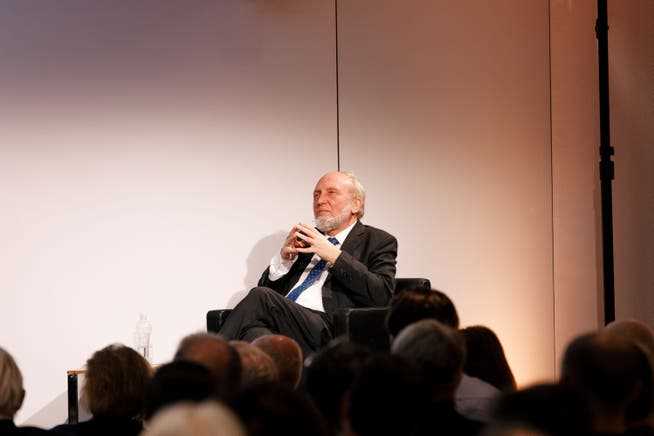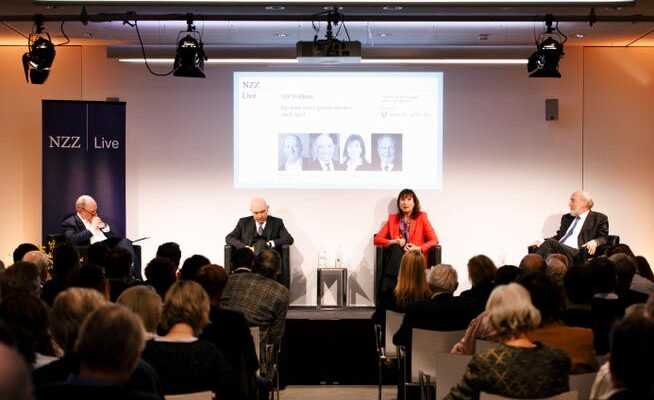Suzanne Thoma, Daniel Jositsch and Hans-Werner Sinn discuss the future of energy with Martin Meyer.
The guests of the NZZ podium (from left): host Martin Meyer, Daniel Jositsch, Suzanne Thoma and Hans-Werner Sinn.
The first NZZ podium in the new year offered a catchphrase that will not only concern us in the immediate present, but will probably continue to do so for a long time to come: “The world has to become greener – but how?” The consequences of climate change can be observed on many levels. On this evening in the sold-out foyer on Falkenstrasse, the main focus was on dealing with energy.
“Our topic today has it all like no other,” said moderator Martin Meyer at the beginning and welcomed the illustrious guests: Suzanne Thoma, CEO of BKW AG (and soon to be President of the Board of Directors of Sulzer), Daniel Jositsch (Zurich SP Council of States) and the German economist and former president of the Ifo Institute, Hans-Werner Sinn.
Dishonest debate in Germany
In his introductory speech, Sinn outlined the technical and economic facets of the problem. He does not consider the German climate target of achieving greenhouse gas neutrality by 2045 to be mathematically possible; currently, only 7.5 percent of energy consumption comes from wind and sun.
Sinn doesn’t think the debate about greener electricity in Germany is honest: coal is just as unpopular as gas or nuclear power. But while the last nuclear power plant is about to be shut down, you have to make do with imports, for example from France. Hydrogen as an energy source, on the other hand, is too expensive and inefficient. Many media suggestions in this debate remained dreams.
With a shirt-sleeved, courageous demeanor, Sinn positioned himself against detailed political regulations of the EU and instead advocated uniform CO2-Prices. The economist used slides to illustrate the problem of unilateralism: If the Europeans didn’t buy oil, then other market participants would, and that wouldn’t help climate protection either.

Pensive: Hans-Werner Sinn gave the introductory speech to the NZZ panel.
Thoma replied that she at least noticed that a certain sense of reality had found its way into Switzerland. One can now discuss more openly whether the technology ban was correct. The danger of a blackout seems real to her, but little threatening, in such a case one could throw off loads.
A committed Jositsch said there was no need to give the Greens sovereignty over green issues. He stated that man is a selfish being, concerned above all with his own survival. Therefore, no solution can be found on a global level with the diverging interests of states and governments.
The Council of States repeatedly and passionately advocated the utopian idea of a constituent assembly on a global level, a “global revolution”. Following on from such a possible solution, Hans-Werner Sinn explained the idea of the “climate club”, an attractive, duty-free zone where the countries involved trade in emission certificates.
Not a trace of apocalyptic
The meeting of business, politics and science was surprisingly harmonious, apart from a few taunts between the lawyer Jositsch and the economist Sinn against their respective professions. There was no trace of apocalypticism, Thoma even thought that dealing with climate change was also a development opportunity for many companies.
Martin Meyer finally agreed with the well-known quote from Winston Churchill: “Never let a good crisis go to waste”.
